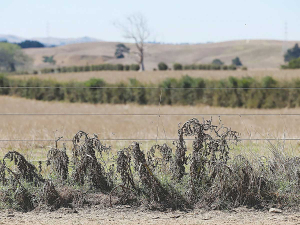Federated Farmers Marlborough Province says it welcomes the announcement yesterday that current dry weather in the top of the South Island would be classified as a medium-scale adverse event.
Yesterday, Agriculture Minister Todd McClay said that after receiving an urgent update from the Ministry for Primary Industries (MPI), he decided to classify drought conditions in the Marlborough, Tasman, and Nelson districts as a medium-scale adverse event.
The announcement unlocks support for farmers, including the ability to defer tax payments or access money, if they have put it aside, under the Farm Income Equalisation Scheme.
The classification is on top of $20,000 in funding made available to the Top of the South Rural Support Trust last month to provide extra support.
“It is clear conditions are tough,” McClay says. “This decision will unlock further support for farmers and growers, including tax support.”
Federated Farmers Marlborough Province president Evan White says the announcement comes as a relief for local farmers.
“Even just having recognition of how extreme things have been will go some way to boosting morale – particularly in areas where they’ve been hit the hardest, like south of Blenheim,” White says.
Conditions are incredibly dry in the region and Blenheim has recorded its lowest rainfall for the last nine months in almost a century, causing a significant impact on the rural community.
“Creeks that have never dried up before have stopped flowing, everything has browned off, and 50-year-old native plantings are starting to die,” White says.
“Stock water is under real pressure as wells dry up,” he says. “Summer crops are failing, and farmers are having to chew into livestock feed set aside for winter.”
White says this is going to have a domino effect because farmers won’t see the usual autumn grass growth.
“Even if there was rain now, it’s debatable how much good it will do this late in the season,” he says.
The season has already proven challenging with low stock prices, especially for lamb, and inflation and interest rates hitting the sector hard.
“Sheep and beef farm profits are at a 30-year low – and then you factor in the drought impacts on top of that. It’s pretty tough,” White says.
“I’ve got some real concern about the mental wellbeing of farmers and their families,” he says. “There’s a lot of pressure starting to build.”
Farmers and growers who require support are encouraged to contact their local Rural Support Trust on 0800 787 254.



















